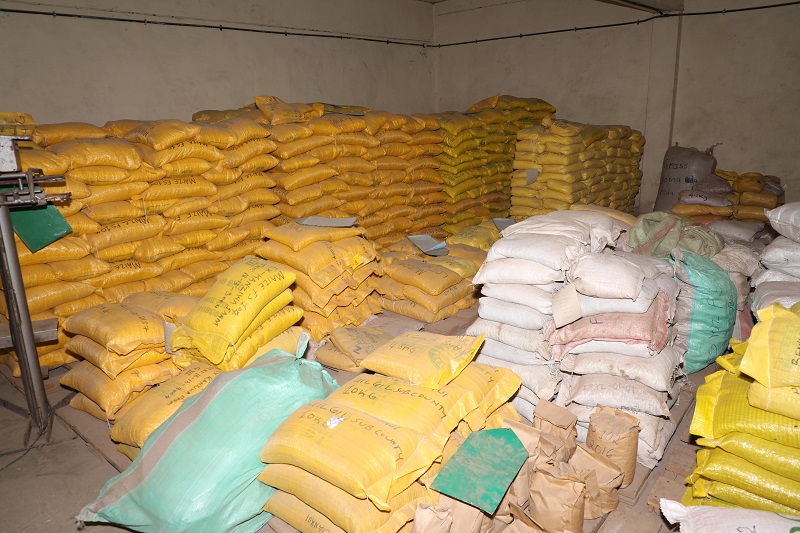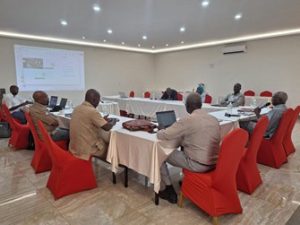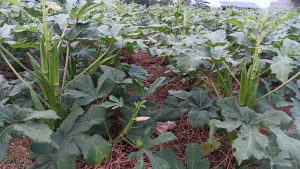How TAAT is facilitating and improving access to quality seeds and pesticides in Africa
Availability of high-quality seeds is critical to achieving high crop productivity for a food secure country.
Yet, access to and use of improved seed is one of the challenges African farmers are still grappling with. It continues to be a pipe dream especially for smallholder farmers on the continent despite the region having huge potential to maximize its agricultural productivity by leveraging on countries with advanced and robust seed systems.
In recent years, several seed varieties have been registered in some countries in Africa, but most countries are still lagging behind in achieving seed security.
The African Development Bank through the Policy Enabler Compact of Technologies for African Agricultural Transformation program is working towards creating an enabling environment that will fast-track crop variety release and registration and spur market incentives for agro-inputs and agricultural produce.
Sponsored by the Bank as part of its Feed Africa Initiative, TAAT’s main objective is to improve the business of agriculture across Africa by raising agricultural productivity, mitigating risks and promoting diversification and processing in 18 agricultural value chains within eight priority intervention areas.
The programme increases agricultural productivity through the deployment of proven and high-performance agricultural technologies at scale along selected nine commodity compacts such as high iron beans, sorghum and millet, maize, rice and wheat. Others are cassava, orange-fleshed sweet potato, livestock and aquaculture.
These work with six enabler compacts addressing transversal issues such as soil fertility management, water management, capacity development, policy support, attracting African youth in agribusiness and fall armyworm response.
The TAAT Policy Enabler Compact (TAAT-PEC) is led by the African Agricultural Technology Foundation (AATF). The compact operates to strengthen economic, trade, and institutional policies that contribute to higher productivity, competitiveness, and processing intensity across value chains and agro-ecological zones by working closely with national and regional partners. Implemented across 18 countries, TAAT-PEC assesses the seed sub-sector with a view to identifying and prioritising interventions for targeted policy advocacy, regulatory and institutional reforms.
According to Dr. Francis Nang’ayo, TAAT-PEC Leader, the compact in two years, has assessed the seed sub-sector in 12 countries, identifying and prioritising policy, regulatory and institutional gaps for reforms.
Dr. Nang’ayo notes that the effort contributed to adoption of the National Seed Policy in Uganda in 2018, DR Congo’s variety catalogue’s update in in 2018, the recent enactment of the Seed Law in Liberia, and Plant Variety Protection Act in Malawi.
“Interventions by TAAT-PEC alongside partner and collaborating institutions resulted in development of guidelines and protocols for accreditation of seed suppliers and agro-dealers in Tanzania, Nigeria and Mozambique. These are integral to mitigation against proliferation of counterfeit agro-inputs,” he said.
The compact also convened high-level policy dialogue workshops to review progress and identify challenges hampering implementation of regionally harmonized regulations for seed in Common Market for East and Southern Africa (COMESA) and Economic Community of West African States (ECOWAS), and for pesticides in East African Community (EAC) regions resulting development of region-specific action plans to address pressing challenges.
’These plans serve as a useful guide for targeted outreach and policy advocacy engagement efforts to fast-track domestication and implementation of harmonized regulatory instruments and contribute to enhanced regional release of varieties and registration of promising pesticides for control of emerging pests such as Fall Armyworm (FAW),’ Nanga’ayo added.
He emphasizes that implementation of harmonized regulatory instruments is key to boosting cross-border trade and getting key technologies into the hands of farmers. To illustrate this point, the TAAT-PEC Leader cites the recent adoption of the Regionally Harmonized Guidelines for Registration of Pesticides in the East Africa Community by the EAC Council of Ministers in November 2019.
‘Two months after adoption of the regionally harmonised guidelines in the EAC region, seven agro-chemical firms submitted applications for testing and registration of promising pesticides for control of the FAW in a move that is poised to help both agro-chemical companies to register products cost-effectively and millions of farmers in the EAC partner states to access quality pest control products faster,’ he added.
In response to emergency pest outbreaks such as the FAW and the desert locusts, TAAT-PEC worked with the EAC Secretariat to draft guidelines on the use of pesticides during emergencies. The guidelines now await technical review and finalisation from the EAC Technical Working Group on Registration of Pesticides. It is expected to be presented to the EAC Council of Ministers in November 2020 for consideration and adoption and will form a framework for rapid registration of pest control products during emergency pest outbreaks.
Recent Stories
Related Stories
- African Development Bank approves phase II of TAAT programme
- TAAT wins National Association of Black Journalists Salute to Excellence Award
- TAAT’s pathway to scale up brings hope to maize farmers in Kenya
- King Charles III: The STEP between a Royal Harvest at City Shamba and a Successful Youth in Agribusiness
- How TAAT is building a pathway for Youth in agriculture in Somalia, DRC, Benin, Kenya, and Tanzania






